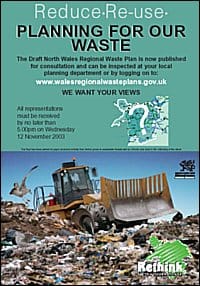The North Wales draft plan is one of three regional waste plans being prepared by authorities in Wales. The South West regional plan was opened up for consultation in August 2003 (see letsrecycle.com story). The preparation of the draft South East Wales plan is expected to be completed in November 2003.
 A flyer raising awareness of the North Wales waste consultation |
The consultation for North Wales, which closes on November 12, 2003, covers
all waste produced in Montgomeryshire, Denbighshire, Flintshire, Wrexham, Conwy, Gwynedd, Anglesey, and the Snowdonia National Park.
North Wales produces about 2.2 million tonnes of waste each year, of which 19% is household waste. Landfill rates are currently about 64%, but only about 7% of household waste is recycled. The new waste plan aims to reach municipal waste landfill targets of 75% by 2010 and 50% by 2013 as set out in the Landfill Directive.
The draft plan, available online at www.walesregionalwasteplans.gov.uk, focuses on increasing recycling and composting in line with the waste hierarchy. It considers a range of technologies including windrow composting, in-vessel composting, and anaerobic digestion.
Options
After increasing recycling and composting, the plan gives six options for dealing with remaining waste:
- Large mechanical biological treatment plant with residual material from the process going to landfill.
- Energy-from-waste with residual material from the process going to landfill.
- Some energy-from-waste, some landfill.
- Landfill.
- Landfill, small amount of energy-from-waste.
- Mechanical biological treatment with residual material from the process going to landfill.
Option six, which also sees more recycling and composting than the other options, received the highest score in the best practicable environmental assessment.
The draft plan stated: “On the basis of the criteria used to score these Options, Option 6 has come out as the most sustainable Option. This is perhaps not surprising given that this Option would re-use, recycle and compost as much of the waste as possible, with the remainder being treated through the MBT process before going to landfill.”
Cost
A consultation booklet is being issued to residents, laying out the options and the levels of funding needed for each.
The expenditure for Option Six was estimated to be the most expensive by the plan, with a net annual cost of 161 million, or 120 per tonne. Options two and five had the second and third highest scores, both advocate the use of energy from waste and both present cheaper solutions.
Residents have been asked whether the plan should look to meet government targets while keeping costs down, or exceed targets through a greater amount of public spending.











Subscribe for free